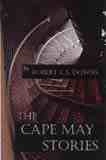Fiction Reviews
The Cape May Stories by Robert C.S. Downs

- The Cape May Stories
- by Robert C.S. Downs
- Windstorm Creative, 150 pp.
- CLR [rating:5]
MORTAL MATTERS
Et in Arcadia ego
Robert C.S. Downs is a master at first person narration, as his first collection, THE CAPE MAY STORIES, demonstrates. Having published six novels earlier, it might be supposed he prefers that larger, expansive form; but a closer look reveals the single concern of a novelist threading twelve stories written over 16 years. The collection might be likened to a picture album arranged chronologically to illuminate certain times and events that reveal critical and crucial passages in one family’s life, here the decades of work and child-rearing — life’s mid-passage. Perhaps rather resembling brief videos, not instants in time as with still photographs; instead, casual, informal takes or “takeouts”: what’s buried in memory or lost over time. Their setting is simple, and governed by a tight focus on the Hendersons: Helen and Jack and their two sons Gary and Louis, who spend summers in Cape May in one of the great, old Victorian-styled houses on Beach Avenue, which runs its 20 or so blocks along the strand between the State Park on the point and the Coast Guard station adjoining the harbor. The house itself needs constant repair, inherited as it was from a brother-in-law who died suddenly, who had it from his father. It stands for the useful and heavy burden of inheritance. Rather than frame or introduce the theme of those moments from the middle passage of life, Downs simply opens his studies in an upstairs bedroom shortly before dawn.
The Hendersons are lower middle-class people constrained to live modest lives, he a high school English teacher in Metuchen, New Jersey, she a part-time school librarian. Nothing sensational erupts in any of the stories, although each has a point and makes it subtly; not conventionally with some flashing epiphanic vision or insight, but by an after-shock unfelt that is gradually recognized and to the reader feels like a needle in the heart. Joyce’s technique in DUBLINERS comes to mind, only with this difference, that Downs is not offering anything so ambitious as a cross-section of a city’s characters. But like Joyce’s subjects a century ago, or Chekhov’s before him, his people are immediately familiar to us who share the trials of our common human fate. And yet that fate must seem to the reader paradoxically uncommon and unknown, for it is mortality, the unknown and undeniable fact of existence, an inexpugnable platitude obscure in our thoughts from waking to sleeping — yet always lurking in the dark of one’s mind. The somber note of that theme, which sounds everywhere and throughout in unexpected modulations often indirectly suggested, appears promptly in the first story, “Shore Light.”
At first I think that what awakens my wife and me in this old Cape May Victorian house is the ocean breeze shaking the shades or the distant thunder from the night’s storm now far out to sea. But it is not, finally, the weather. It is Gus, our old black Lab sleeping on the floor at the end of our bed who, though in drugged sleep, signals us with several shrill sounds that he is worse this morning than last evening. When he is quiet again I listen for my wife’s breathing, which I know instantly is as deep and slow and as fake as mine. We are aware that the other is awake, but, as if in compromise, we remain private.
The problem posed in what follows is one known to most of us: how and when to put down a failing member of the family, a dear, old dog, a friend who’s come to his last hours. Part of the anguish arises from the fact that a pet is an innocent creature that suffers diminishment and pain stoically and cannot be not responsible for its fate, and may be dimly aware of it. The Hendersons’ decision is tacitly taken; the Korean lady vet is appointed to come at five to administer the lethal injection. The Hendersons go for an outing with Gus, who can scarcely manage his hind legs to walk. As they return home, their younger son runs to meet them with the alarming news that his brother’s head is wounded — they were sliding down the banister, which like much in the 80-year old house is rickety: and the loose pillars swayed and threw Gary down and into the baseboard. A scalp wound, manageable, but upsetting because of its sheer bloodiness. It ought to be noted that in the course of Jack Henderson’s preceding rumination, we are apprised of the neighborhood, the shoreline sand, some locals and their current problems, jobs, marital questions the like. Jack doesn’t talk about himself, but does think about Helen, her anxieties, her physical condition (a bad back), especially her moods, which though labile and always liable to trip him up, are as clear to him and as forever strange as a woman’s can be even to her mate of decades. He takes in her facial expressions and understands what he sees, yet remains constant in his dispassionate acceptance. We learn enough in a few sentences about her family, a sister widowed young and the widowed mother starting to turn vague. We are given glimpses of the passing weathers of an average Cape May day following the last night’s storm, the clearing day, the disheveled look of the beach — whatever the narrator’s eye parses as they stroll with the dog. In short, the ordinary domesticity of the locale, delineated succinctly without comment, poignant in its American familiarity, yet somehow providing an unsettling sense of the alien strangeness of the commonplace — when it is really looked at. One thinks of great European nature morte works of commonplace objects set out by a Chardin or silent Dutch landscapes that are simply there.
In that first story, Henderson, still lying in bed reflects that though he had recently sweated to paint their large bedroom and thought it a fine job, as had Helen, the ceiling is not at all perfect, for the “shore light” exposes flaws, fine cracks and intrinsic decay. That thought returns later with the breaking of the staircase, and a post felt to be rotted out under the front porch; it subtly exemplifies the unstated motif of the book: nothing’s perfect, not even summer months passed in a summer resort that seems an Arcadian paradise. (Incidentally the source of my Latin epigraph is Death, which says, I too am in Arcadia.)
Downs’ narrator constantly takes in the least and the major features presented by his immediate world, whether it be in the Hendersons’ house or the short 20 blocks fronting Beach Avenue. (I know there is a harbor and Coast Guard station at one end, and a civic park at the other, having “googled” Cape May’s satellite image.) The twelve stories, set over the years from when the boys are not yet adolescents until the close, when one is married after college and the other returns from a short marriage that failed, seen as a whole yield an impression of the vicissitudes dotting the middle passage of our years. We enter the unwitnessed, private scenes in the life of a family you would not think interesting were you sitting in an adjoining booth at the town diner.
Which would be a pity, since the recurring careful settings and descriptions of the passing hours of each tale — sky, ocean, beach, streets, the few odd people who come and go — illuminate the book somewhat like great 17th and 18th century paintings. They are a varying single landscape that holds the utterly domestic, or domesticated, events like an impartial backdrop, enveloping them with a brooding sense of the pathos of daily life, what Classically was called lacrimae rerum, or the sadness of life, the sorrows of man, as Vergil put it. For, without making any fuss, Downs reveals at each juncture or crisis that our best years also are beset by quiet misfortune, the deaths of our nearest and dearest. The case includes not only the moribund retriever Gus, but what they found on that walk, a seagull casually shot that lies dying under a park bench. And, at the end, the release of a mother slipping into Alzheimer’s. All of it, confusions and suffering, is stoically addressed by Jack Henderson and understood implicitly by Helen. Is it something that will depress a reader, or truly refresh the sense of that tenuous hold on our being at any hour, and lead to recognition, even a sort of exultation, rather, exaltation, of emotion, which whispers, Yes, this is how things are. A heroic humility waits to be discovered in Jack Henderson’s dispassionate narrations.
It might be added that part of the revelation offered in reading THE CAPE MAY STORIES is the tenderness, the delicacy of feeling Downs shows towards his characters, in particular in Henderson’s as it were sidelong glances at Helen. It is never said in so many words, but we are led to realize that we scarcely know or cannot finally know one’s spouse, whether wife or husband, whether after a year of marriage or scores of years. At one point the question is posed, How is it that their marriage can have endured? It is and remains a mystery; nevertheless the reasons are known to both, feelingly so to say, and not in shallow, pop psychology terms. Those reasons do not lend themselves to facile verbalization. Furthermore these stories show, they do not merely tell, what, despite defeats and sorrows, it is to love. Downs’ is a rare achievement.
In one most affecting story, “Three’s a Crowd,” Helen suddenly announces that an early boy friend (or lover?) is about to turn up as their guest in Cape May. Teddy is a handsome man with whom she used to love to dance; it seems that over the years he’s made a successful career as a movie producer. Long ago, he’d condescended to Jack … because he was “varsity,” graduating from Columbia University, whereas Jack was merely a student at Rutgers, that is, nothingsville. His demeanor then had not been overtly insulting, merely a casual, unspoken statement of fact. One can imagine how Jack had been forever humiliated by Teddy’s flashing grin as he took Helen’s arm that afternoon and led her off. The barely-contained torment of raging jealousy now gratuitously provoked in him, lover, husband, and father of her children — for Helen had married Jack instead — why? God only knew, when perhaps Helen herself did not — is managed marvelously. Jack accedes to their meeting for dinner in Cape May for old time’s sake, and discreetly excludes himself. But when Helen is returned that night to their house, he cannot refrain from lurking outside in the dark and worse, sneaking up to peer through a living room window to stare at them as they dance intimately but chastely to a favorite old tune. Ironically, it is only a farewell dance: for that ancient “rival” had flown east, coming not to carry her off but to be treated in New York for terminal brain cancer. It‘s a devastating situation for all three; yet for Jack (and the reader) it ends with hidden tears of relief salted with pity for our mortal condition. Henderson also understands (as does the reader) that the heart of his beloved Helen will remain sealed, forever her own secret.
Downs may be a story-teller of our human condition; yet his Jack Henderson, a Metuchen, New Jersey, high school English teacher, is no raging Othello. “Three’s a Crowd” in short renders a picture of ordinary life in our time, and it’s crafted finely. Like the others, it is suffused with tact, exhibiting a grace that illuminates with its aura our brief creaturely existence. Moreover, it is marked by the restraint and forbearance that comes from self-recognition. Its artfulness offers to teach us what stoic humility can be like, and it is Everyman’s. Consider the final paragraph of the last story, “Seeing Verna.” Helen’s mother Mary is clearly well into Alzheimer’s and by this point an action must be taken — not calling in the vet for a dying dog, but her sister and husband to help carry her off from her brief visit to them in Cape May to a residence for the dysfunctional elderly. (In a previous episode, the Hendersons had worried about how their respective widowed mothers would get along, only to be surprised by being shunted aside and discarded when the two old women find themselves happily engaged in their own generation’s world of memory and interests.) Now, with Mary and Helen’s sister Maureen and husband Dennis chatting on their porch, Jack swears he sees his “mother come out the front door of the Lobster House with a tall man, both in love and leaning on each other. They hold hands all the way to the parking lot.“ Again, on the next day, after their return from the institution where they have left Mary to live until her end, Jack is about to get out of his car when, as he later tells Helen, “A VW goes by on the other side of the street and makes no sound.” He thinks, “I’m sure I get another glimpse of Verna, the short white hair, hands high on the wheel, nose forward. Before I catch myself I actually wonder where she’s going.” A short while later, Helen’s sister and husband having departed for home, the pair go down to walk along the water’s edge on Philadelphia Beach:
I tell Helen about the two times since yesterday I’ve imagined seeing Verna and she turns and looks up at me and says she’d forgotten this week was the anniversary of her death. Then she asks if I know how long it’s been since we’ve made love and I tell her I do. Her hand curls as it goes all the way up my arm and she leans her head into my shoulder. “Remember,” she says, how that used to solve everything?”
Dante, we are told, valued above all what was termed dignitas. That’s something scarcely imaginable in our time, beset as we are by the loudspeaking, ever more sensational, images and scenarios thrust upon our attention by the multifarious formats of the media. Still and all, Downs presents us with a fair-enough surrogate for that lost quality, dignity. I think it is something ardently to be wished and sought for: the possibility of decency. Rare in our time, the writing in THE CAPE MAY STORIES is superb, even magical in its clear-sighted modesty of style, one that implicitly offers in plenitude examples of decency. A surprising, and exhilarating, visit to Cape May awaits readers.
Jascha Kessler
Professor Emeritus of Modern English & American Literature, UCLA
Santa Monica, CA
www.jfkessler.com
Related
Jascha Kessler
Professor Emeritus of Modern English & American Literature, UCLA
Santa Monica, CA
www.jfkessler.com








2 Comments
You must be logged in to post a comment Login